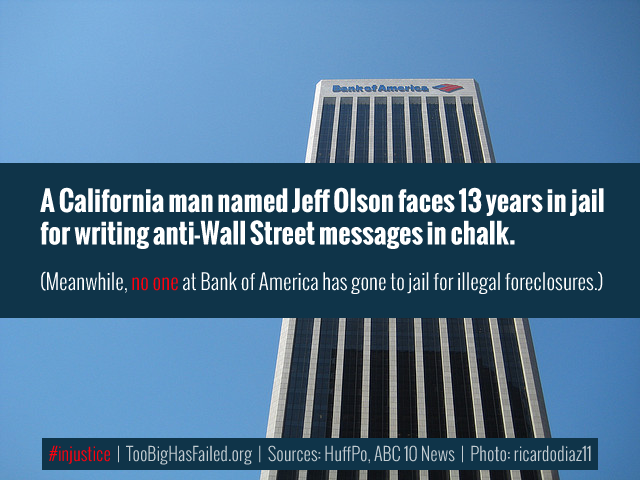
“Whether you know it or not, Wall Street wants to steal your future.” - William Bernstein, author of The Four Pillars of Investing
—
PBS Frontline recently aired “The Retirement Gamble,” a biting documentary that exposes the ways in which Wall Street wreaks havoc on retirement accounts.
We’ve been curious about whether the claims in the film are true. After all, the film makes some bold claims about how most Americans have made tremendous mistakes in saving for retirement by allowing Wall Street to eat up investment returns.
One of the key points in the documentary is that actively managed mutual funds—the kind Wall Street manages, typically as part of 401(k) plans—aren’t good for us. These funds contain hidden and excessive fees, fees that 65% of Americans are unaware of, according to a report from Demos. These Wall Street fees seem tiny, but when the costs are compounded over a few decades, they amount to substantive gains (for Wall Street).
The chart below shows what these fees look like.
You can see that compounded interest turned an average initial investment of $10,000 in 1980 into a gain of $179,200 by 2005.
But the investor didn’t get the full $179,200. Instead, the fund incurred Wall Street fees of $81,000, leaving only $98,200 for the investor (before taxes). The wins for Wall Street were enormous.

In other words, what initially may have seemed like an awesome total gain, suddenly wasn’t. Wall Street was charging an average of 2.5% in hidden fees during that time, fees that added up to $81,000 when compounded over 25 years.
Unfortunately for all of us, Wall Street has been raking in the profits from this gig for decades, and it’s only gotten worse. To illustrate: the annual fees for management and trading costs rose from $7 billion in 1980 to nearly $100 billion in 2006, according to a study from Kenneth French, a finance professor at Dartmouth. That money—nearly $100 billion per year—went to the asset management divisions of places like JPMorgan, Citi, Goldman Sachs, etc. (No wonder they’ve grown at the expense of the rest of us.)
What Can We Do?
The truth is, we don’t have to let Wall Street take so much from us in fees and trading costs.
In the same study we just cited, Kenneth French also calculated that if every portfolio hadn’t been actively managed, the total annual cost to investors would be only $8.9 billion—more than 10 times less than the $100 billion Wall Street sucks away from us.
Kenneth French is talking index funds—funds that invest in the entire stock market and aren’t actively managed (i.e. no one’s actively trading the stocks in the fund).
Because the investor doesn’t pay someone to manage the fund, it returns more money on average to the investor and less to Wall Street. (In fact, if you don’t buy an index fund from a Wall Street firm, then they’ll get nothing from your account.)
Index funds were first made available to the public by John Bogle, the founder of the nonprofit group Vanguard. Bogle’s been advocating for index funds for decades, and he features prominently in “The Retirement Gamble.” Essentially, Bogle says that it’s a mathematical certainty that the average index fund will beat the average actively managed fund. And the evidence supports him. (See here, here, here, here, here, here, here, here, and here, for starters. Or this page where we’ve collected the important quotes from those links.)
For now, let’s look at a direct comparison to the chart above. In this next chart, we show what would have happened if the investor from the first chart had invested in an index fund rather than an actively managed mutual fund. We used Vanguard’s index fund as an example because we’re getting the data from Bogle. Index funds don’t have to be with Vanguard (though Vanguard is the only nonprofit organization in the industry and therefore perhaps the best choice for investors).
You can see that the investor gets far more money with the index fund.

So, according to the chart, Vanguard takes a tenth of what Wall Street does, leaving nearly twice as much money for the investor. In other words, with the index fund the investor saved $72,600. That money could go a long way for a retiree (and that’s the return on just a $10,000 investment).
What’s more, the same data from John Bogle shows that when you factor in tax rates (which are lower for index funds because they have far less trading turnover), index funds give nearly three times as much in real returns compared to actively managed mutual funds.
To reiterate: America doesn’t have to give Wall Street $100 billion per year in management fees. Instead, we can switch from managed funds to index funds and fight Wall Street excess.
This is especially important for millennials, who as a group are highly skeptical of Wall Street and are starting (or will soon be starting) to save for retirement. Kick Wall Street to the curb.
So Why Don’t More People Switch To Index Funds?
Reason #1: Lack of Awareness From Investors/Employers
Perhaps the biggest reason that people haven’t made the switch is that they’re simply unaware of the fees. Even Martin Smith, the correspondent and co-writer in “The Retirement Gamble,” wasn’t initially aware of what Wall Street was doing to his retirement. In the process of interviewing people for the documentary he discovered what was going on, and at the end of documentary he says he’ll be doing more research.
So we asked him via Twitter whether he ending up investing in index funds after doing the project, and he said, “Yes. I did.”
Like 65% of Americans, Smith simply wasn’t aware of Wall Street’s fees. (That’s why Wall Street keeps them hidden!)
If Wall Streeters said upfront that they’d charge you $81,000 to manage your account for 25 years, you probably wouldn’t do it. So one explanation of why people don’t switch is that they—including employers who decide on 401(k) options—just aren’t aware of what’s going on.
Reason #2: Lack of Awareness From Advisors
But what about all the financial advisors who steer people into actively managed funds? Don’t they know what they’re up to?
Not necessarily. In the Frontline documentary, Smith asks an advisor from Prudential if she’s studied the data on index funds, and she says (earnestly, it appears) that she hasn’t. So it’s possible that the industry is just incredibly insular and doesn’t fully understand why index funds are best for most Americans.
That said, we find it very difficult to believe that most advisors are unaware that they’re raking in huge profits from accounts that underperform index funds. In fact, Jason Zweig, a columnist for the Wall Street Journal, tells Martin Smith that the dirty little secret of the business is that most managers have index funds for their own accounts, but they won’t admit it to clients (unless you get a few beers in them, according to Zweig).
Reason #3: Some Brokers and Managers Think They’re Smarter Than Other Market Players
Another factor here is that some brokers and managers are convinced that they can beat the market. They know that the zero-sum stock market game requires half of the trades to win and half to lose, but they’re convinced that they can pick the right fund and make the right trade. It’s the other guy who’s stupid, right?
There could be truth to this. Savvy investors might be able to outguess the market. But can they outguess the market consistently? Over decades? Again, the data says otherwise. One study from US News aggregated all the proprietary funds from JPMorgan Chase, Goldman Sachs, and Morgan Stanley and found that 77% of the funds underperformed the benchmark index over ten years.
That’s kind of insane, isn’t it? The “smartest” investment bankers couldn’t consistently beat the benchmark. And so these guys are charging high fees to get less for their clients.
What’s more, JPMorgan Chase, Goldman Sachs, and Morgan Stanley all have access to huge databases and algorithms to analyze the market. So what chance do other players have in consistently outguessing the market for 20, 30, 40, or 50 years?
Reason #4: Brokers Get Kickbacks From the Funds They Sell
One of the most disturbing sections in “The Retirement Gamble” is when Martin Smith discovers that brokerage firms (places like Fidelity, eTrade, Scottrade, Charles Schwab, etc) get kickbacks from Wall Street when they promote certain funds. The brokers argue that since they’re doing all the work of selling the fund, they should get a cut of the big fees. After learning what’s going on, Martin Smith looks through his own retirement plan and finds these kickbacks were passed along to him and were listed under “revenue sharing.”
This means that brokers don’t necessarily have a vested interest in finding the best returns for you. Instead, they have an interest in finding the fund that get them the biggest cut of a given fund’s management fee.
Conclusion
We don’t have to put up with this. We can be aware that Wall Street is siphoning $100 billion in management fees and trading costs per year for doing something that is largely unnecessary and even harmful. We can get out of the Wall Street casino and have lots more money available to us for retirement.
Don’t just take our word for it, since we’re just an advocacy group against Wall Street excess. Research further. Watch “The Retirement Gamble” and see our collection of excerpts showing why index funds are superior to managed funds. It’s a collection that answers questions like, “What about people like Warren Buffett who did well in the market?” and “What do I do if my 401(k) options don’t include index funds?”

















